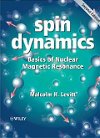Saturation Transfer and Exchange
Exchange processes that occur on
the NMR time scale affect the NMR line shapes and can be studied by line shape analysis. If the exchange process is slow on the NMR time scale, one can employ
EXSY or inversion transfer methods to study the exchange. An alternative to these is the saturation transfer technique. In this method, one of the slowly exchanging resonances (A) is
saturated with low power CW irradiation and the effect on the intensity of the resonance of the exchange partner (B) is monitored. If there is exchange between A and B during the period of saturation some of the saturation from A will be transferred to B. The change in the intensity of B will depend on both the rate of exchange,
k and the relaxation time of B,
T1B . If there is no nuclear Overhauser effects between A and B, then the rate of exchange is given by:

where
Io is the intensity of B with no saturation of A, and
I? , is the intensity of B when A is saturated for an infinite time. The saturation transfer effect is useful for situations where the exchange is slow on
the NMR time scale but faster than (or of the same order as)
T1B. An example using 31P NMR is illustrated in the figure below for a ruthenium phosphine complex which undergoes slow exchange between isomers with different modes of bonding. The 31P [1H] NMR spectrum is shown in the upper right-hand panel of the figure. In this case, the P atoms of isomer A are chemical shift equivalent and give a singlet while those for isomer B are chemical shift nonequivalent and give an AB pattern. The spectrum of isomer B is shown in the lower panel of the figure as a function of saturation time of isomer A.

Many thanks to Carolyn Higman and Prof.
Deryn Fogg for kindly allowing their data to be used in this post.



Source:
University of Ottawa NMR Facility Blog



